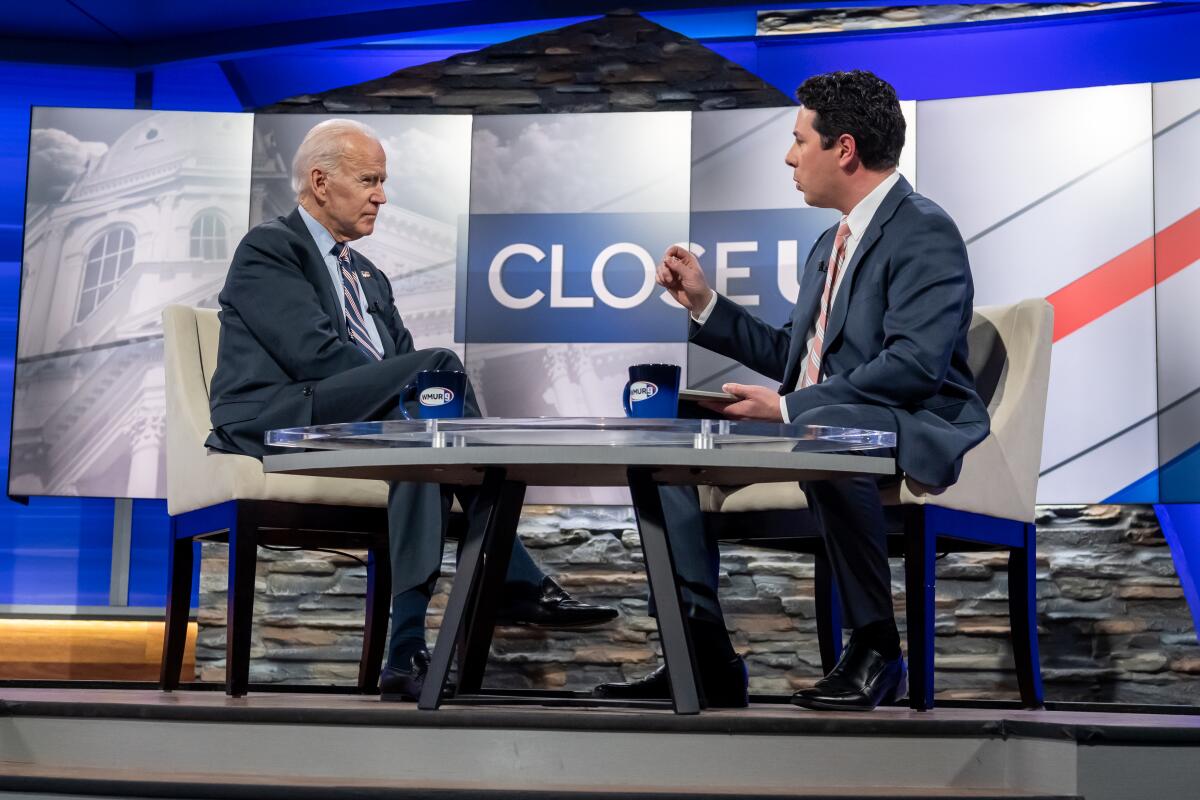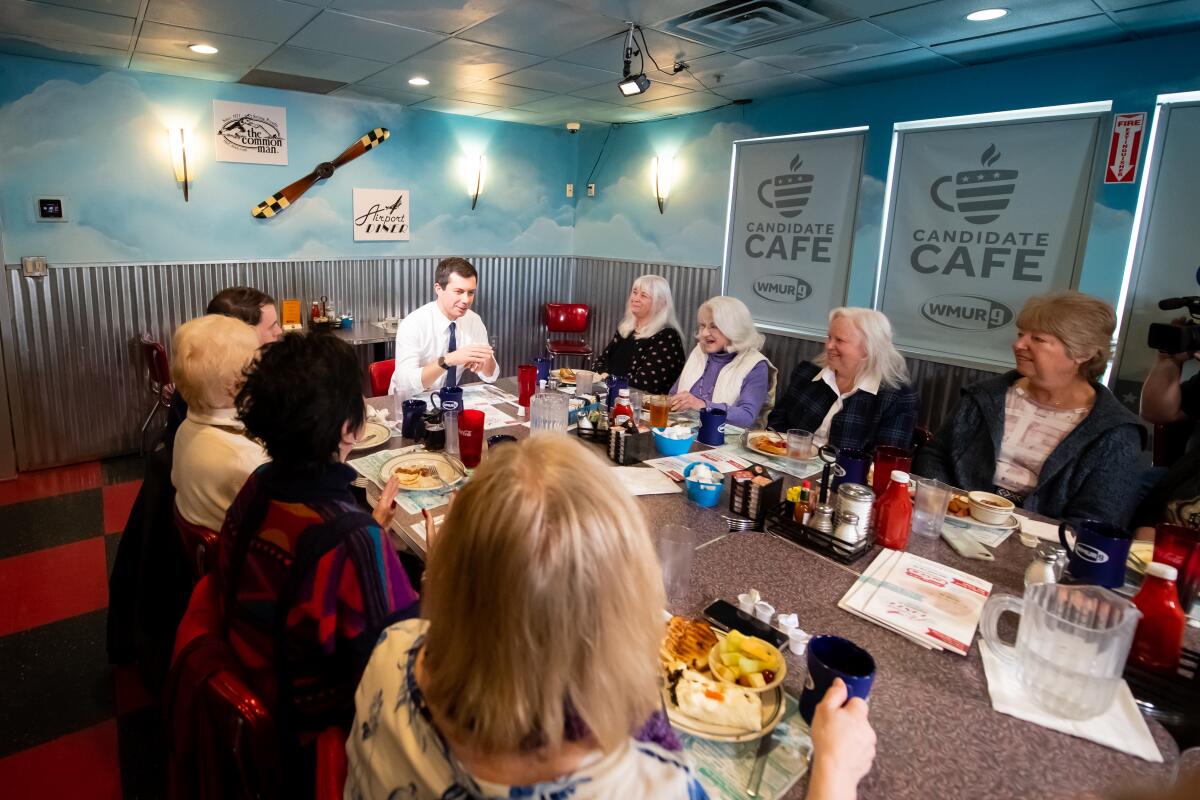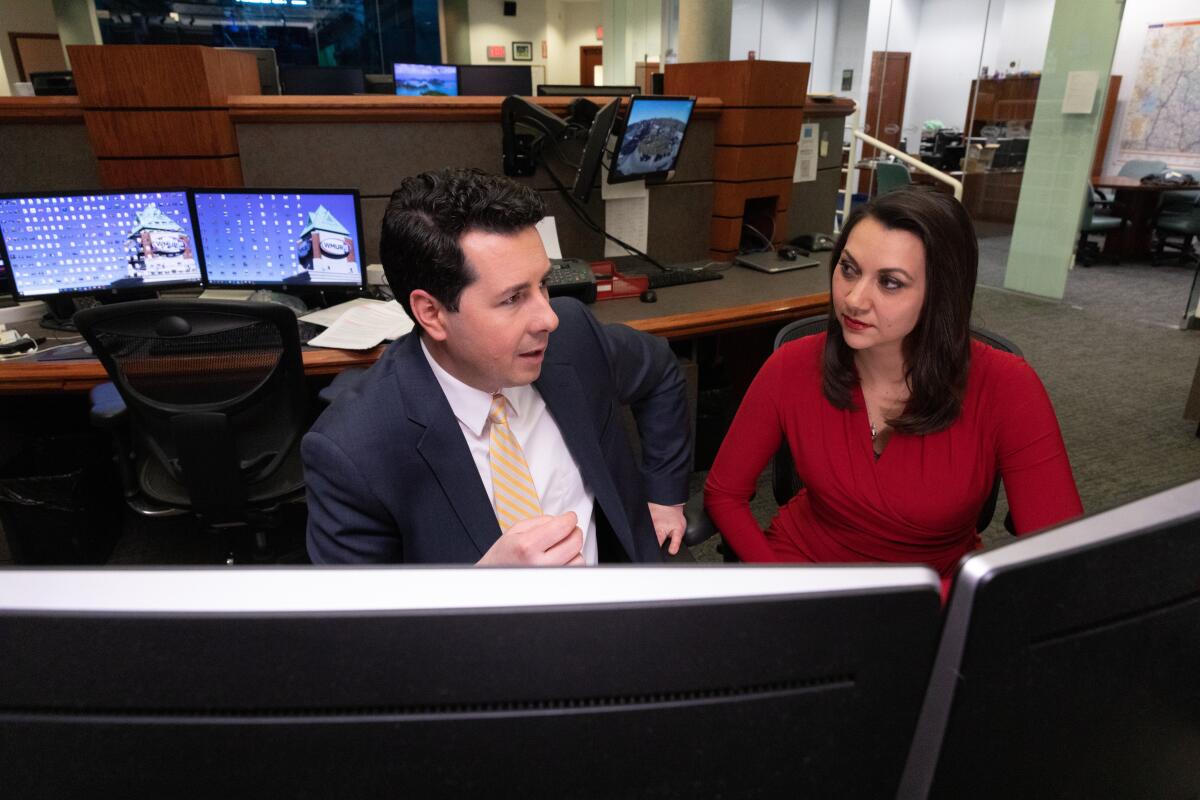After chaotic Iowa caucuses, this TV station plays a big role in New Hampshire

- Share via
MANCHESTER, N.H. — The unsuccessful 1996 and 2000 presidential campaigns of publishing scion Steve Forbes may have faded from memory. But he will always have a special place at Manchester, N.H.-based WMUR, the only commercial TV station in the state that holds the first presidential primary.
The candidate spent nearly $6 million to buy time on the station — including half-hour blocks during which he took phone calls from viewers. The cash deluge led politically minded locals to refer to WMUR’s 68,000-square-foot headquarters adjacent to the city’s historic Amoskeag Mills as “the house that Steve Forbes built.”
The television business went through a major period of disruption in the two decades that followed, with the proliferation of cable channels and later streaming services. But WMUR’s status as the most influential local TV outlet in the country every four years has remained intact. Presidential aspirants descending on the state in the early pivotal contest fill hours of time on its local newscasts and public affairs programs — and spend millions on political ads.
Leading up to the Feb. 11 primary, candidates can regularly be seen in WMUR’s newsroom. Former Vice President Joe Biden and his entourage came through on a recent afternoon. He posed for selfies with staff members and stopped at the sports desk to lament over the playoff fate of his Philadelphia Eagles before being interviewed by WMUR political director Adam Sexton.
“They cover, pound for pound, probably more politics than any station in the country,” said Rick Klein, political director for ABC News. “There really isn’t anything else like it. They get access to candidates that frankly a lot of networks would dream of. The candidates make themselves available to WMUR because they know that people watch.”
The primary campaign also means national exposure for the station’s journalists. On Friday, Sexton, 39, and WMUR anchor Monica Hernandez, 34, joined ABC News anchors George Stephanopoulos and David Muir and correspondent Linsey Davis in questioning the candidates at the network’s Democratic primary debate. It was watched by 7.86 million viewers, according to Nielsen.
Political advertising dollars for TV have grown in recent years even as more money goes into digital media. Research firm Advertising Analytics projects political ad spending on broadcast TV for the 2020 election cycle will hit $3.26 billion, up from $1.73 billion in 2016.
Most spending occurs closer to the general election in November. But WMUR, owned by the privately held New York media conglomerate Hearst, gets an early piece of the pie thanks to the political calendar and geography — big advantages when TV outlets are struggling to retain viewers and profits.
Manchester — a city of 111,000 people — is counted by Nielsen as part of the Boston TV market, but WMUR is the only station that reaches the entire state of New Hampshire. In a typical week, 56.2% of 468,730 television households watch the station at least once, according to Nielsen.
WMUR’s morning newscast from 6 to 7 often gets a 50% share of the TV audience in the six New Hampshire counties that also receive Boston stations, a staggering number in today’s fragmented market.
“They are insulated from some of the other trends in the TV business,” said Bill Hague, executive vice president for Magid, a media consulting firm that has worked with Hearst. “They’ve maximized the value of being a dominant TV station in the market. Coupled with increased political spending, they are on fire.”
WMUR also benefits from New Hampshire’s pride in having the first primary in the nation, which is looking even better in light of chaotic Democratic caucuses held in Iowa on Monday. A New Hampshire state law allows the primary date to be moved in order to keep it ahead of other states in the presidential cycle.
The distinction of having the influential primary has embedded WMUR in the nation’s political culture. Microphone flags with the station’s logo have turned up on fictional White House series such as “Veep” and “The West Wing.”
Candidates spend early and often on the station. WMUR took in nearly $40 million in presidential political ad revenue during the 2016 primary campaign, when both the Republican and Democratic parties were choosing nominees and 18 candidates were in the race.
The total revenue from the 2020 primary will be less, as President Trump does not have a formidable opponent from his party and only Democrats are buying ad time. Most candidates are not using money from political action committees, which spent heavily previously.
Nonetheless, in the weeks leading up to the primary, WMUR’s sales department frequently huddled to find ways to accommodate the intense demand for ad time. The station’s highest-priced ads of the primary season were on Friday’s debate and Sunday’s telecast of the Oscars, on which campaigns paid WMUR $10,000 per 30-second commercial, several times the rate it receives for many of the ABC network programs it runs in prime time.
Most of WMUR’s political ad time is sold on its local newscasts. The station has 4 1/2 hours of news a day, 10 hours on weekends and a long-running daily half-hour magazine show called “Chronicle,” which over 10 years on the air has done feature stories in all 221 towns and 13 cities in New Hampshire.
The station even has a local historian — 83-year-old Fritz Wetherbee — whose segments on the newscasts are assigned as homework for local schoolchildren.
“Local television news is still one of the most desired time periods to be in for any political candidate and any political action committee,” said Gerry McGavick, director of sales for WMUR, who also oversees political advertising for all of Hearst.
McGavick deals mostly with media-buying agencies based in Washington, D.C., but the campaigns also try to establish their own relationships with the station. Bags of Hawaiian macadamia nuts given out by Democratic candidate Rep. Tulsi Gabbard’s staffers during a recent visit were still circulating on the sales department’s floor.
While political ad dollars have long flowed into WMUR, Hearst invested in improving the local news after acquiring the station in 2001 for $185 million from Imes Corp., a family-owned outfit that lacked the resources of a large TV station ownership group.
Hearst owns 33 stations with annual revenues of $1.2 billion, making it the 11th-largest station group in the country, according to research firm BIA Advisory Services. Boosted by ad spending for congressional races, the stations had record revenue and profits in 2018, Hearst said. In a strong political year, WMUR ranks among its top 10 performers.
“The previous owners had a lot of shows that were filled with candle-making and stuff like that because they couldn’t afford to buy programming,” said Jeff Bartlett, a veteran TV news executive and general manager of WMUR.
Hearst acquired strong syndicated daytime shows for WMUR such as “Ellen,” which helps drive viewers into its afternoon and evening newscasts. The station beefed up its news coverage to serve highly politically engaged viewers who expect to see the candidates several times before they go to the polls.

The station has deep ties to the community. Many employees have worked there for decades, able to play on a big-time media stage while living in a bucolic state with no income or sales taxes. News director Alisha McDevitt is a 25-year veteran who joined the station when she was still a college senior. She now oversees a news department with more than 60 employees.
While New Hampshire residents can watch news on Boston stations, WMUR is where they will see reports on government meetings, snowstorms, fires, accidents and local charity events. During high school football season, there is a WMUR photographer at every game.
“The viewers see us every day,” said Hernandez, a San Diego native who joined the station in 2018. “We’re out there covering baseball games and ice pond hockey tournaments.”
Presidential campaigns recognize the connection WMUR’s journalists have with the viewers and gravitate to them in order to reach New Hampshire voters, who savor their role in the candidate selection process. Hernandez said she came to WMUR from a much larger station — WFAA in Dallas — because the primary offered an opportunity to cover national politics close up.

“We get advantages that other stations and the networks don’t get,” Bartlett said. “Sometimes you’ll be standing in a line with a bunch of other reporters and the candidate comes over to one of our guys and says, ‘Come on over for a sit-down.’ The other guys are not getting a sit-down. So that creates a little bit of tension, but it’s just a fact of life.”
The heated partisan rhetoric that saturates cable news does not show up in WMUR’s political coverage. There is no editorializing, commentary or even polling, which has largely been inaccurate in the state in recent primary campaigns as New Hampshire voters are last-minute deciders.
The station produced 25 hourlong town hall programs (Andrew Yang appeared on the first one back in February 2019), where studio audience members asked questions of the candidates. Fourteen hours of less formal exchanges between the candidates and voters for a series of segments called “Candidate Cafe” were shown on WMUR newscasts and social media platforms.
“We are presenting the facts, and people can draw their own conclusions from them,” McDevitt said. “We are very serious about that.”
WMUR was one of the earliest stations to expand online. The station’s website offers an extended version of its “Conversations With the Candidates” series for viewers who want to go deeper. The website has also become the base for New Hampshire political columnist John DiStaso, formerly of the New Hampshire Union Leader, who has covered the state for 35 years.
Dante Scala, a professor of political science at the University of New Hampshire, said WMUR understands that it has a symbiotic relationship with the primary — which he refers to as “the franchise.”
“WMUR benefits from the primary enormously, but they do go out of their way to provide a large amount of information,” he said. “Part of their job is to try to make sure that New Hampshire voters maintain their reputation as being well-educated active participants.”
More to Read
Inside the business of entertainment
The Wide Shot brings you news, analysis and insights on everything from streaming wars to production — and what it all means for the future.
You may occasionally receive promotional content from the Los Angeles Times.











